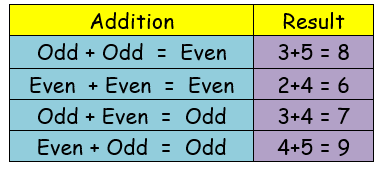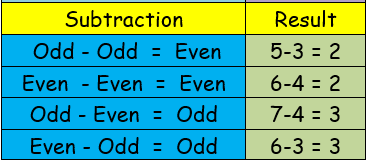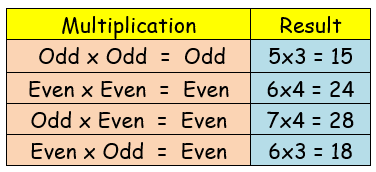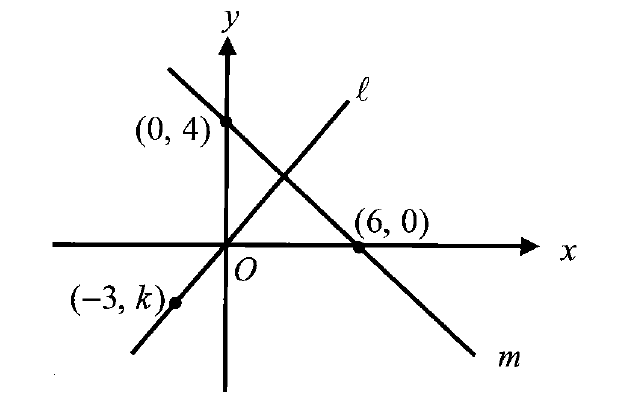PROBLEMS ON PROPERTIES OF ODD AND EVEN NUMBERS
Odd Number :
Any integer that cannot be divided exactly by 2 is an odd number.
Even Number :
Any integer that can be divided exactly by 2 is an even number. The last digit is 0, 2, 4, 6 or 8



Example 1 :
The sum of three even numbers
Solution :
Let us take any 3 even numbers.
For example,
If a = 2, b = 4 and c = 6
The sum of three even numbers = 2+4+6
= 12
12 is even number.
So, sum of three even numbers is even.
Example 2 :
The sum of three odd numbers
Solution :
Let us take any 3 odd numbers.
For example,
If a = 1, b = 3 and c = 7
The sum of three odd numbers = 1+3+7
= 11
11 is odd number.
So, sum of three odd numbers is odd.
Example 3 :
The product of an even and two odd numbers
Solution :
Let us take an even number and two odd numbers.
For example,
If even number is 4, then odd numbers are 3 and 7.
product = 4 × (3 × 7)
= 4 × 21
= 84
84 is even number.
So, product of even and two odd numbers is even.
Example 4 :
The sum of four consecutive odd numbers.
Solution :
If x be the first odd number, then four consecutive odd integers are
x, x + 2, x + 4, x + 6.
Sum of four consecutive odd numbers
= x+(x+2)+(x+4)+(x+6)
= 4x+12
= 4(x+3)
x is odd 3 is also odd, sum of odd and odd will given even number and product of even and even is even.
Example 5 :
(even)3 means ‘an even number is raised to the power 3’. Which of these are odd and which are even ?
(i) (even)2 (ii) (odd)2 (iii) (even)3 (iv) (odd)3
(v) (even)4 (vi) (odd)4
Solution :
(i) (even)2
(even)2 = even × even
= even
(ii) (odd)2
(odd)2 = odd × odd
= odd
(iii) (even)3
(even)3 = even × even × even
= even × even
= even
(iv) (odd)3
(odd)3 = odd × odd × odd
= odd × odd
= odd
(v) (even)4
(even)4 = even × even × even × even
= even × even
= even
(vi) (odd)4
(odd)4 = odd × odd × odd × odd
= odd × odd
= odd
Example 6 :
What is the smallest positive whole number which when increased by 1, is divisible by 3, 4 and 5 ?
Solution :
By finding the least common multiple of 3, 4 and 5, we get 60.
60 is exactly divisible by 3, 4 and 5.
So, the required number is 59.
Example 6 :
The product of seven consecutive even integers is 0. What is the least possible value of any one of these integers?
(A) -14 (B) -12 (C) -10 (D) -8 (E) -6
Solution :
Since the product of 7 consecutive even numbers is 0, one of the numbers must be 0
If we start with -14, the seven consecutive numbers will be
-14, -12, -10, -8, -6, -4, -2
Here we cannot include 0. Then the product will not become 0.
Then the answer is -12.
Example 7 :
If x and y are positive integers and (xy + x) is even, which of the following must be true?
(A) If x is odd, then y is odd.
(B) If x is odd, then y is even.
(C) If x is even, then y is odd.
(D) If x is even, then y is even.
(E) x cannot be odd
Solution :
= (xy + x)
Option A :
If x is odd, let x = 3
If y is odd, let x = 5
= (3(5) + 3)
= 15 + 3
= 18
It is even. Then option A is correct.
Example 8 :
The square of which of the following would be even number ?
A) 521 B) 322 C) 1237 D) 923
Solution :
Using the properties of odd and even numbers, the product of
- even x even = even
- even x odd = even
- odd x even = even
- odd x odd = odd
In option B, 322 is even. Multiplying two even numbers we will get even number. Then option B is correct.
Example 9 :
If x and y be positive integers such that x is prime and y is composite. Then
A) y - x cannot be even number
B) (x + y)/x cannot be an even number
C) x + y cannot be even
D) None of these statements are true
Solution :
Let us assume x = 3 and y = 10
Option A :
y - x = 10 - 3 ==> 7 cannot be even
Option B :
(x + y)/x
= (3 + 10)/3
= 13/3
Cannot be even.
Option C :
x + y = 10 + 3
adding even number by odd, we will get odd. Then,
= 13 cannot be even
So, the answer is no statements is true. Option D is correct.
Kindly mail your feedback to v4formath@gmail.com
We always appreciate your feedback.
©All rights reserved. onlinemath4all.com
Recent Articles
-
AP Calculus AB Problems with Solutions (Part - 8)
Feb 05, 25 12:22 PM
AP Calculus AB Problems with Solutions (Part - 8) -
AP Calculus AB Problems with Solutions (Part - 9)
Feb 05, 25 12:15 PM
AP Calculus AB Problems with Solutions (Part - 9) -
Digital SAT Math Problems and Solutions (Part - 106)
Feb 04, 25 08:16 AM
Digital SAT Math Problems and Solutions (Part - 106)
